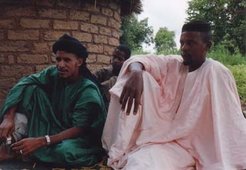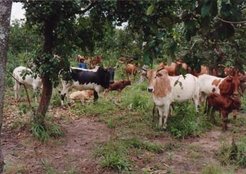Les Fulbe des espaces interstitiels: pastoralisme, migration et identités (Burkina Faso-Côte d ’Ivoire)
Habilitation thesis
The habilitation thesis, on Les Fulbe des espaces interstitiels: pastoralisme, migration et identités (Burkina Faso-Côte d ’Ivoire ) , is the final step of the project “migrations and identities” we have recently terminated at the Max Planck Institute. This thesis combines ethnographic methods with a thorough investigation of written sources. It deals with conditions and forms of Fulbe migrations into Mali, Burkina Faso and Côte-d’Ivoire. It also investigates interethnic relationships and statehood as a field of interaction of Fulbe and various non-Fulbe groups, and the influence of the state on these relations.
The study starts with a broad overview of Fulbe ethnogenesis and traces the historical background of pastoral mobility in pre-colonial times. Then we focus on the more recent migrations of Fulbe into southern Burkina Faso, southwestern Mali and northern Côte-d’Ivoire . The work combines the analysis of social, economic and political organization with the study on ethnicity and state intervention. It provides a comparison of forms of farmer-herder relations at different periods and in different places that span village communities, states and administrative systems. What emerges from this comprehensive approach is the actual relevance of the work that shows that behind the issue of Fulbe migrations are social and political questions of their integration in three West African countries and beyond.
Pastoralism, migration and identity: The Fulbe in Burkina Faso and Côte d'Ivoire
The tendency of people to continuously move for ritual, economic and political reasons is one of the most enduring characteristics of the history of the West African savannah. This project contributes to the study of the conditions and forms of pastoral mobility in Mali, Burkina Faso and Côte d'Ivoire. Two interrelated topics, which the project investigates, are the dynamics of identity and statehood as a field of interaction between peasants and pastoralists. Our principal concern in the fieldwork has been to observe and collect data on cattle husbandry, livestock policies, land use, mobility patterns of the Fulbe and the modalities of their relations with sedentary groups. The writing of the preliminary results are now in progress. The description of the project given here deals with the main outlines of patterns that have been found out.
The present situation of the West African Fulbe cannot be evaluated without a reference to the past. Information collected on pastoral movements in the border region of Burkina Faso, Mali and Côte d'Ivoire show, indeed, that the mobility patterns of the Fulbe are historically rooted. In addition to being old, these mobility patterns prove adaptable to new social and political conditions. The West African Fulbe are usually separated from other groups by ethnicity, occupation and religion. Nevertheless, information available demonstrate that exclusion and integration are two strategies which, according to circumstances and social status, evolve alternately or may be used in different ways by the state, societies and sedentary groups with which pastoral nomads interact. In former times, the pastoral expansion led to the cultural assimilation of non-Fulbe populations and their incorporation into Fulbe state formations. The migration of Fulbe pastoralists and their specific adjustment to new contexts also resulted in their partial or total assimilation into village communities and earlier sedentary states. Some Fulbe shifted from cattle husbandry to agriculture and changed their ethnic identification after having adopted the culture, language and traditions of their hosts, while others mixed with local populations through intermarriage and gave rise to new "ethnic groups".
Les Fulbe des espaces interstitiels: pastoralisme, migration et identités (Burkina Faso-Côte d ’Ivoire)

A comparative analysis, combining oral traditions and written sources, seems to be helpful in understanding these processes. A limited comparison is likely to enable us to draw up a tentative typology of political integration and exclusion of the Fulbe pastoralists. We are thus looking into the position of early pastoral nomads in ancient sedentary states and administrative systems - e.g. the Bambara and Mossi kingdoms in Mali and Burkina Faso respectively - in order to compare it with their current position in postcolonial states. The Fulbe pastoralists are considered as irrational or wandering producers that governments and development planners try to control if not to settle. The case of modern Côte d'Ivoire, where the state implemented an attractive pastoral policy and encouraged the Fulbe to involve in the market economy, is an example of such tentative politics of control and integration of pastoral nomads in postcolonial states. Moving into new contexts leads to new arrangements with local groups. Independently of the state intervention, the Fulbe pastoralists always negotiate with customary landowners in order to stay in villages and exploit natural resources. Access to land is, among other socio-cultural institutions, one of the means by which they are integrated into villages communities. Various forms of cooperation and institutional arrangements binding together pastoralists and peasants have been noted.

Conflict represents another facet of pastoralist-peasant relations. Crop damage and natural resource competition are the main reasons for conflict between the two groups. As a result, right to residence, grazing right or right over water may become fragile and even contested. The pastoralists may ultimately be evicted from their residence in a hard conflict situation. In northern Côte d'Ivoire, we have noted that right to residence tends to laps where Fulbe cattle repeatedly make crop damage. In the area of study, there are also evidence suggesting that the state control over land is more nominal than real. Vacant land does not exist in the "traditional" conception. Indigenous peasants usually encroach on land delineated by the state as forest zone or seen as empty space to be allocated to pastoral groups. In the Ivorian case, the state intervention for controlling and delineating pastoral zones in order to promote cattle husbandry and reduce at the same time peasant-pastoralist conflicts have had a limited impact on the relations between the two groups.
Finally, as observed in Côte d'Ivoire, the pastoral mobility may have political consequences. This is not peculiar to that country, but there interest groups of peasants are stronger than that of Fulbe pastoralists regarded as "strangers". Although they have the support of the government - because they are supposed to hold a crucial role in the national economy - the presence of the Fulbe in Côte d'Ivoire has become a matter of political debate. There are indications showing that the politicisation of peasant-pastoralist conflicts is closely connected with the intervention of a range of interest groups trying to take political and economic advantages of pastoralist-peasant interactions. Among these are local politicians, administrative officials, traditional hunters and civil servants. This study of pastoralism, migration and identity, in its final shape, would perhaps help to advance the anthropological and historical understanding of the West African Fulbe.

